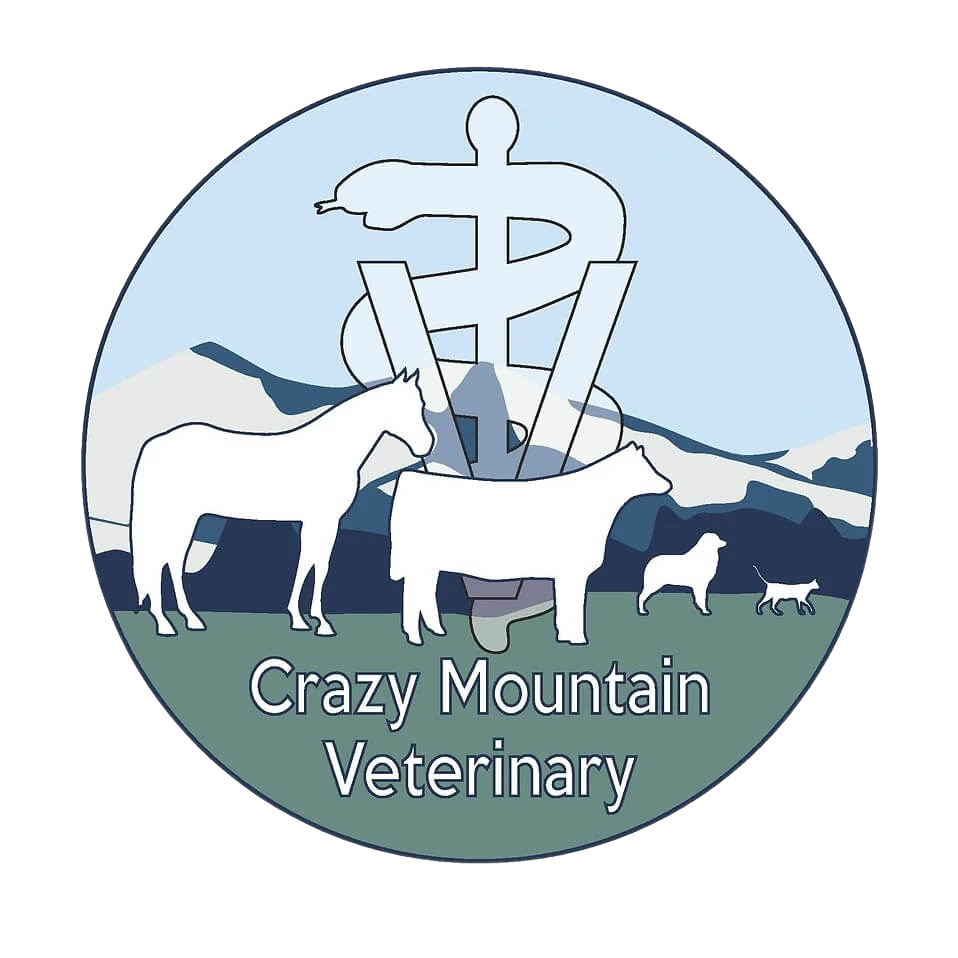Hello Crazy Mountain Vet Clients!
We hope your fall work went well, and winter has been kind to you so far. With calving season right around the corner, it is time again to think about scours in your calves, and what vaccinations you can give to your cows now, to protect them.
When we talk about scours, what do we mean?
Scours is a broad term to describe diarrhea and inflammation of the digestive tract in young calves. Most cases of scours occur between day 3 and 16 of life in calves. Scours can be caused by a number of things including viruses, bacteria, and parasites.
The primary effect of scours in calves is the imbalance of electrolytes and dehydration, which can cause death if not treated in an effective/timely manner. Clostridium perfringens also causes damage to the calf's vital organs, which can also do major damage to the calf. Even if a calf survives scours, that calf will likely have severe scarring of the digestive tract, and will not grow and produce as well as its healthy counterparts. In addition to loss of growth in surviving calves, producers also lose money in lost man hours, supplies, vet bills, and calves that don’t survive.
So what can we do to prevent scours in your calves and save on your bottom line?
We can first look at how calves get scours. The main cause of scours, no matter the infectious agent, is overcrowding. Calves pick up the agents from feces of infected calves, dirty teats on cows, and some bacteria can even live in the ground and cause problems for many years. The veterinarians of Crazy Mountain Vet like the Sand Hills Calving System, which aims to keep exposure to a minimum, by grouping calves of the same age together, and moving heavy’s to new, clean pasture frequently, to make sure calves are hitting the ground on non-contaminated areas. The downside of this system is the amount of work involved. Many producers find that this system can be hard to implement.
The next thing we can do is vaccinate cows before they calve, giving the calves protection while still in utero. Vaccinating calves when they hit the ground is another option, however, we can run into maternal antibody interference when vaccinating calves.
At Crazy Mountain Vet, we use a variety of commercial scour vaccines, and a few autogenous vaccines made from samples taken from our area of practice. Each vaccine has unique administration guidelines, with varying timelines for optimal protection. We urge you to call us to talk about what vaccine you want and should be using, and find out when you should be administering said vaccine.
If you find yourself in a situation where your late calves are the ones having the most problems, we might consider giving your late calving cows a booster of the scour vaccine, or giving the calves a shot when born. This is a common problem, because the scour vaccine given to the cows prior to calving can lose effectiveness after a certain period of time, causing less antibodies released in the colostrum, leaving the last group of calves more vulnerable than the older calves.
Even with vaccination protocols and improved calving systems, there is still a chance you could see scours in your calves, what should you do if you see an outbreak?
Early intervention is key, a calf will be more likely to respond to treatment if caught early. The first thing that needs to be addressed is the electrolyte imbalance and dehydration, so start with administering electrolytes as needed. We prefer electrolytes without sodium bicarbonate, so that it can be safely mixed with milk replacer if needed. You can always check with us to see which electrolytes we recommend. If oral fluids and electrolytes don’t help the calf, the next step is IV fluid therapy. We have worked the last few calving seasons on developing a flow chart for treating calves with scours, that we implemented at all of our clinics. If you find yourself needing IV fluid therapy for a calf, please call us and bring the calf in for treatment.
If you are losing calves, or seeing a lot of sickness, we encourage you to have one of our DVM’s collect samples to submit for testing. Often if we can zero in on the cause of scours, we can help manage the outbreak, or give better protection next year.
Calving season can be hard, dealing with scours makes it even harder. We are always here to answer any questions you have, please don’t hesitate to call our offices any time.
Crazy Mountain Veterinary Service Team
